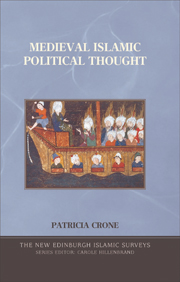Book contents
- Frontmatter
- Contents
- List of charts
- Preface
- Addenda and corrigenda
- I THE BEGINNINGS
- II THE WANING OF THE TRIBAL TRADITION, c. 700–900
- 4 INTRODUCTION
- 5 THE KHĀRIJITES
- 6 THE MUTAZILITES
- 7 THE SHĪITES OF THE UMAYYAD PERIOD
- 8 THE ABBĀSIDS AND SHĪISM
- 9 THE ZAYDĪS
- 10 THE IMAMIS
- 11 THE ḤADĪTH PARTY
- III COPING WITH A FRAGMENTED WORLD
- IV GOVERNMENT AND SOCIETY
- Charts
- Bibliography, abbreviations, and conventions
- Index and glossary
11 - THE ḤADĪTH PARTY
from II - THE WANING OF THE TRIBAL TRADITION, c. 700–900
Published online by Cambridge University Press: 05 August 2013
- Frontmatter
- Contents
- List of charts
- Preface
- Addenda and corrigenda
- I THE BEGINNINGS
- II THE WANING OF THE TRIBAL TRADITION, c. 700–900
- 4 INTRODUCTION
- 5 THE KHĀRIJITES
- 6 THE MUTAZILITES
- 7 THE SHĪITES OF THE UMAYYAD PERIOD
- 8 THE ABBĀSIDS AND SHĪISM
- 9 THE ZAYDĪS
- 10 THE IMAMIS
- 11 THE ḤADĪTH PARTY
- III COPING WITH A FRAGMENTED WORLD
- IV GOVERNMENT AND SOCIETY
- Charts
- Bibliography, abbreviations, and conventions
- Index and glossary
Summary
Scholars had appeared within all parties, in all Muslim settlements, in the course of the Umayyad period. By the late Umayyad/early Abbāsid period some of them had come to form a party of their own under the label aṣḥāb alḥadīth, ‘adherents of Ḥadīth/reports’, or ‘Ḥadīth party’, or, as the term is more commonly translated, ‘Traditionalists’. Initially they seem to have been concentrated in Iraq and the Ḥijāz, but they soon spread to Khurāsān, Egypt, and elsewhere.
The adherents of Ḥadīth believed that the Prophet's practice (sunna) could be recovered from Ḥadīth, ‘traditions’, that is short statements reporting the Prophet's solutions to legal or doctrinal problems as they had arisen in his time. Most aṣxyhāb al-ḥadīth were active compilers, teachers, and transmitters of such reports (muḥaddithūn, ‘traditionists’). In the late Umayyad period Ḥadīth reporting the practice of the Prophet, as opposed to that of a Companion or later figure, had great rarity value. They also had great popular appeal, for they were typically transmitted orally, with just one transmitter per generation in the chain of authorities (isnād) attached to them, so that hearing one was almost like hearing the Prophet himself. The Muslim world was soon to be flooded with reports from the Prophet, but initially, Prophetic traditions were in the nature of relics, which also induced a sense of direct contact, and the social prestige accruing from the possession of such treasured items was great.
- Type
- Chapter
- Information
- Medieval Islamic Political Thought , pp. 125 - 142Publisher: Edinburgh University PressPrint publication year: 2004



